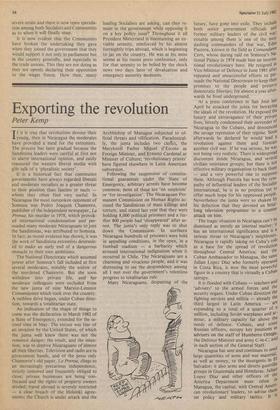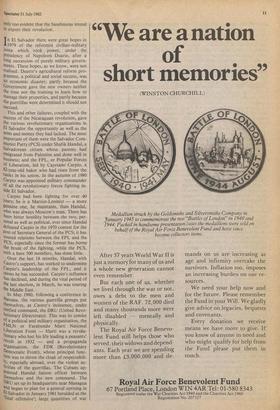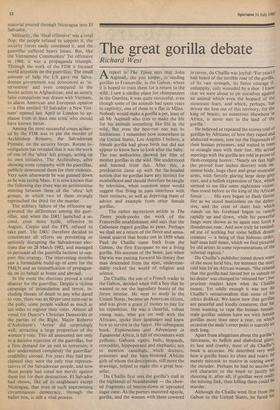Exporting the revolution
Peter Kemp
T f it is true that revolutions devour their
young, then in Nicaragua the moderates have provided a meal for the extremists. The process has been gradual because the Sandinista leaders were careful at first not to alarm international opinion, and easily reassured the western liberal media with glib talk of a 'pluralistic society'.
It is a historical fact that communist governments have always regarded liberals and moderate socialists as a greater threat to their position than fascists or nazis — whom they often find very useful. In Nicaragua the most outspoken opponent of Somoza was Pedro Joaquin Chamorro, publisher of the independent newspaper, La Prensa; his murder in 1978, which provok- ed international condemnation and per- suaded many moderate Nicaraguans to join the Sandinistas, was attributed to Somoza. In fact, as recent evidence has shown, it was the work of Sandinista extremists determin- ed to make an early end of a dangerous obstacle to their own ambitions.
The National Directorate which assumed power after Somoza's fall included at first several moderates, notably the widow of the murdered Chamorro. But she soon withdrew into private life, and' her moderate colleagues were excluded from the new junta of nine Marxist-Leninist Comandantes which took over the country. A ruthless drive began, under Cuban direc- tion, towards a totalitarian state.
An indication of the shape of things to come was the declaration in March 1982 of a State of Emergency, extended for the se- cond time in May. The excuse was fear of an invasion by the United States, of which the junta well knew there was not the remotest danger; the result, and the inten- tion, was to deprive Nicaraguans of almost all their liberties. Television and radio are in government hands, and of the press only Chamorro's old paper, La Prensa, clings to an increasingly precarious independence, strictly censored and frequently obliged to close; private businesses are being con- fiscated and the rights of property owners eroded; travel abroad is severely restricted —a clear breach of the Helsinki agree- ments; the Church is under attack and the
Archbishop of Managua subjected to of- ficial threats and vilification. Paradoxical- ly, the junta includes two clerks, the Maryknoll Father Miguel d'Escoto as Foreign Minister, and Ernesto Cardenal as Minister of Culture; 'revolutionary priests' have figured elsewhere in Latin American subversion.
Following the suspension of constitu- tional guarantees under the State of Emergency, arbitrary arrests have become common; most of these are 'on suspicion' or 'for investigation'. The Nicaraguan Per- manent Commission on Human Rights ac- cused the Sandinistas of mass killings and torture, and stated last year that they were holding 8,000 political prisoners and a fur- ther 800 people had 'disappeared' after ar- rest. The junta's only reply was to shut down the Commission. In northern Nicaragua hundreds of prisoners were held in appalling conditions, in the open, in a football stadium — a barbarity which aroused international indignation when it occurred in Chile. The Nicaraguans are a charming and vivacious people, and it was distressing to see the despondency among all I met over the government's relentless progress to totalitarian rule.
Many Nicaraguans, despairing of the
future, have gone into exile. They include both senior government officials and former military leaders of the civil war; notable among them is one of the most dashing commanders of that war, Eden Pastora, known in the field as Comandante Cero, whose daring raid on Somoza's Na- tional Palace in 1978 made him an interna- tional revolutionary hero. He resigned as Vice-Minister of Defence in June 1981 after repeated and unsuccessful efforts to Per' suade the National Directorate to keep their promises to the people and preserve democratic liberties; for almost a year after- wards he lived underground. At a press conference in San Jose last April he attacked the junta for betraying the ideals of the revolution. He exposed the luxury and extravagance of their private lives; bitterly condemned their surrender of Nicaragua to the Cubans, and denounced the savage repression of their regime. Soon afterwards he declared he would lead a revolution against them and forecast another civil war. If he was serious, he was not being very realistic. There is widespread discontent inside Nicaragua, and several civilian resistance groups; but there is not effective military organisation to back thou — and a very powerful one to suppress them. Although Pastora has won the sym- pathy of influential leaders of the Socialist International, he is in no position yet to offer much hope for his oppressed people. Nevertheless the junta were so shaken bY his defection that they devoted an hour' long television programme to a counter attack on him.
The tragic situation in Nicaragua can't be dismissed as merely an internal matter; It has an international significance and is a serious threat to Nicaragua's neighbours. Nicaragua is rapidly taking on Cuba's role as a base for the spread of revolution throughout Central America; and the Cuban Ambassador to Managua, the satne Julian Lopez Diaz who formerly operated in Costa Rica, is now the most powerful figure in a country that is virtually a Cuban satrapy. It is flooded with Cubans — teachers and 'advisers' to the armed forces and the security organs. Under Cuban direction the fighting services and militia — already the third largest in Latin America — are expanding to a total of a quarter of a million, including Soviet warplanes and ar' mour, a military capacity far above the needs of defence. Cubans, and sonic Russian officers, occupy key positions as advisers on the staff of Humberto Ortega, the Defence Minister and army C-in-C, and in each section of the General Staff.
Nicaragua has sent and continues to send large quantities of arms and war material: as well as money, to the insurgents Salvador; it also arms and directs guerrilla groups in Guatemala and Honduras. Julia° Lopez Diaz and other officers of the America Department meet often ir Managua, the capital, with Central Antal" can revolutionary leaders, to advise the'!I on policy and military tactics. It Is only too evident that the Sandinistas intend to export their revolution.
1 n El Salvador there were great hopes in 1979 of the reformist civilian-military Junta which took power, under the Presidency of Napoleon Duarte, after a long succession of purely military govern- ments. These hopes, as we know, were not realised. Duarte's agricultural reform pro- gramme, a political and social success, was an economic disaster; partly because the Government gave the new owners neither the time nor the training to learn how to Manage their properties, and partly because the guerrillas were determined it should not succeed.
This and other failures, coupled with the success of the Nicaraguan revolution, gave the various revolutionary organisations in El Salvador the opportunity as well as the arms and money they had lacked. The most important of them were the Salvador Com- munist Party (PCS) under Shafik Handal, a Salvadorean citizen whose , parents had emigrated from Palestine and done well in business; and the FPL, or Popular Forces of Liberation, led by Cayetano Carpio, a 62-Year-old baker who had risen from the ranks in his union. In the autumn of 1980 Carpio was appointed military commander Of all the revolutionary forces fighting in- side El Salvador.
Carpio had been fighting for over 40 Years; he is a Marxist-Leninist — a more genuine one, he maintains, than Handal, Who was always Moscow's man. There has been bitter hostility between the two, per- sonal as well as political, ever since Handal defeated Carpio in the 1970 contest for the Post of Secretary General of the PCS; it has soured relations between the FPL and the PCS, especially since the former has borne the brunt of the fighting, while the PCS, With a bare 500 memliers, has done little.
Over the last 18 months, Handal, with Castro's support; has worked to undermine Carpio's leadership of the FPL, and it seems he has succeeded. Carpio's influence has declined, and during the vital period of the last election, in March, he was touring the Middle East.
In May 1980, following a conference in Havana, the various guerrilla groups put themselves, at Castro's insistence, under unified command, the DRU (United Revo- lutionary Directorate). This was to consist .(,),f a political and military organisation, the I'MLN or Farabundo Marti National Liberation Front — Marti was a revolu- tionary who lost his life leading a peasants' revolt in 1932 — and a propaganda °,rganisation, the FDR (Revolutionary uemocratic Front), whose principal func- tion was to throw the cloak of respectabili- tY, especially abroad, over the violent ac- tivities of the guerrillas. The Cubans ap- pointed Handal liaison officer between ,themselves and the new command. The 0RU set up its headquarters near Managua and began to plan for a general uprising in tl Salvador in January 1981 heralded as the 'final offensive'; large quantities of war
material poured through Nicaragua into El Salvador.
Militarily, the 'final offensive' was a total flop; the people refused to support it, the security forces easily contained it, and the guerrillas suffered heavy losses. But, like the Vietnamese Communists' Tet offensive in 1968, it was a propaganda triumph. Through the work of the FDR it focused world attention on the guerrillas. The small amount of help the US gave the Salva- dorean government was denounced as 'in- tervention' and even compared to the Soviet action in Afghanistan; and an utterly false comparison was drawn with Vietnam, to alarm American and European opinion — a film entitled `El Salvador: a New Viet- nam' opened last April in London to ap- plause from at least one critic who should have known better.
Among the most successful coups achiev- ed by the FDR was to pin the murder of Archbishop Romero, the Salvadorean Primate, on the security forces. Recent in- vestigation has revealed that it was the work of one of the `ultra' left groups, acting on its own initiative. The Archbishop, after showing some sympathy with the guerrillas, publicly denounced them for their violence. Very soon afterwards he was gunned down as he was saying Mass. It is now known that the following day there was an acrimonious meeting between three of the `ultra' left groups, in which two of them strongly reproached the third for the murder.
The military failure of the offensive ag- gravated the differences among the guer- rillas, and when the DRU launched a se- cond, even more futile, offensive in August, Carpio and the FPL refused to take part. The DRU therefore decided to concentrate all efforts on preventing or seriously disrupting the Salvadorean elec- tions due on 28 March 1982, and managed to persuade all the guerrilla factions to sup- port this strategy. The intervening months saw a formidable build-up of arms for the FMLN and an intensification of propagan- da on its behalf at home and abroad.
In the event the elections proved a total disaster for the guerrillas. Despite a vicious campaign of intimidation and terror, in- cluding threats of death to any who dared to vote, there was an 80 per cent turn-out at the polls; some people walked as much as ten miles to register their votes. Almost all voted for Duarte's Christian Democrats or the parties of the Right. Major Roberto d'Aubuisson's 'Arena' did surprisingly well, attracting a large proportion of the women's vote. This all amounted not only to a decisive rejection of the guerrillas, but a firm demand for an end to terrorism; it also undermined completely the guerrillas' credibility abroad. For years they had pro- claimed they were the only true represen- tatives of the Salvadorean people, and now (hose people had voted not merely against them but for their destruction. El Salvador had shown, like all its neighbours except Nicaragua, that even in such unpromising circumstances democracy, through the ballot box, is still a vital process.








































 Previous page
Previous page